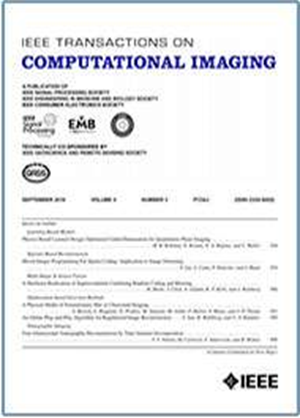Computational Comparison and Validation of Point Spread Functions for Optical Microscopes
IF 4.8
2区 计算机科学
Q2 ENGINEERING, ELECTRICAL & ELECTRONIC
引用次数: 0
Abstract
Point spread function (PSF) is quite important in modern computational microscopy techniques. Various approaches for measuring and modeling point spread functions have been proposed for both fluorescence and label-free microscopes. Among the various PSF candidates, it is often difficult to evaluate which PSF best suits the microscope and the experimental conditions. Visual qualification is often applied because there are hardly any techniques to quantify the quality of PSF as a basis for comparing different candidates and selecting the best one. To address this gap, we present a validation scheme based on the concept of confidence interval to evaluate the quality of fit of the PSF. This scheme is rigorous and supports precise validation for any microscope's PSF irrespective of their complexity, improving the performance of computational nanoscopy on them. We first demonstrate proof-of-principle of our scheme for a complex but practical label-free coherent imaging setup by comparing a variety of scalar and dyadic PSFs. Next, we validate our approach on conventional scalar PSFs using fluorescence based single molecule localization microscopy which needs PSF to compute the locations of single molecules. Lastly, we demonstrate how the scheme can be used in practice for challenging scenarios using images of gold nanorods placed on and illuminated by a photonic chip waveguide imaged using a label-free dark-field microscopy setup. Through these experiments, we demonstrate the generality and versatility of our PSF validation approach for the microscopy domain.光学显微镜点扩展函数的计算比较与验证
点扩展函数(PSF)在现代计算显微镜技术中占有十分重要的地位。对于荧光显微镜和无标记显微镜,已经提出了各种测量和建模点扩展函数的方法。在各种候选的PSF中,通常很难评估哪种PSF最适合显微镜和实验条件。通常采用视觉鉴定,因为几乎没有任何技术可以量化PSF的质量,作为比较不同候选人和选择最佳候选人的基础。为了解决这一差距,我们提出了一种基于置信区间概念的验证方案来评估PSF的拟合质量。该方案是严格的,支持对任何显微镜的PSF进行精确验证,而不管其复杂性如何,从而提高了计算纳米显微镜的性能。我们首先通过比较各种标量和二元psf,证明了我们的方案在复杂但实用的无标签相干成像设置中的原理证明。接下来,我们使用基于荧光的单分子定位显微镜在传统的标量PSF上验证我们的方法,这需要PSF计算单分子的位置。最后,我们演示了该方案如何在实践中用于具有挑战性的场景,使用使用无标签暗场显微镜设置成像的光子芯片波导上放置并照亮金纳米棒的图像。通过这些实验,我们证明了我们的PSF验证方法在显微镜领域的通用性和多功能性。
本文章由计算机程序翻译,如有差异,请以英文原文为准。
求助全文
约1分钟内获得全文
求助全文
来源期刊

IEEE Transactions on Computational Imaging
Mathematics-Computational Mathematics
CiteScore
8.20
自引率
7.40%
发文量
59
期刊介绍:
The IEEE Transactions on Computational Imaging will publish articles where computation plays an integral role in the image formation process. Papers will cover all areas of computational imaging ranging from fundamental theoretical methods to the latest innovative computational imaging system designs. Topics of interest will include advanced algorithms and mathematical techniques, model-based data inversion, methods for image and signal recovery from sparse and incomplete data, techniques for non-traditional sensing of image data, methods for dynamic information acquisition and extraction from imaging sensors, software and hardware for efficient computation in imaging systems, and highly novel imaging system design.
 求助内容:
求助内容: 应助结果提醒方式:
应助结果提醒方式:


